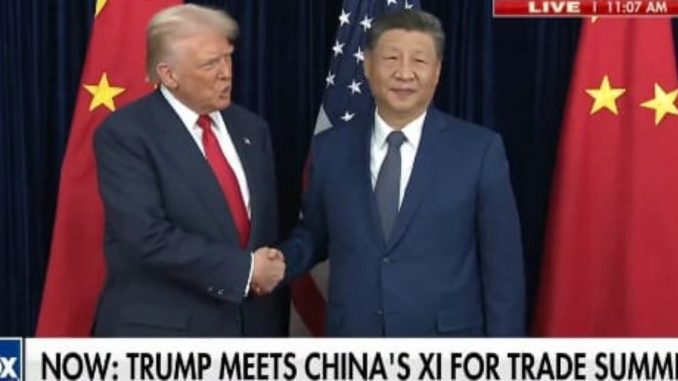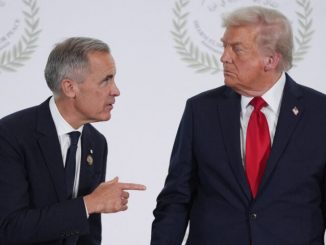
Published October 31, 2025
Xi Jinping’s Public Praise of Trump: A Diplomatic Gesture with Global Ripples
In a development that surprised political observers, Chinese President Xi Jinping publicly expressed gratitude to former U.S. President Donald Trump for his “enthusiasm in promoting peace” and for contributing to global stability. The unexpected acknowledgment, first reported by Gateway Hispanic, occurred during a meeting in Busan, South Korea, where Trump and Xi attended the 2025 Asia-Pacific Economic Cooperation (APEC) summit.
While the tone of Xi’s statement caught attention worldwide, it also reignited debates about China’s strategic messaging and the evolving U.S.–China relationship. The meeting marked the first face-to-face interaction between the two leaders in six years and came amid renewed trade pressures, supply chain disruptions, and geopolitical uncertainty.
The Meeting in Context
According to Gateway Hispanic and a related report by Joe Hoft, Xi’s remarks came following private discussions that reportedly covered issues such as tariffs, rare-earth exports, and regional security. Trump, for his part, described the meeting as “positive” and suggested that both countries were ready to “move forward on fair trade and global peace.”
Observers note that China’s tone was unusually warm. Xi’s decision to publicly praise Trump contrasts with Beijing’s typically guarded diplomatic language, suggesting an intentional effort to project cooperation. However, major news outlets like Fox News and AP News have urged caution, pointing out that no official joint statement or signed economic framework has yet been released.
Why This Moment Matters
For years, U.S.–China relations have defined global economic direction. Tariff wars, sanctions, and technology bans have reshaped global markets and pushed multinational companies to diversify production. A single gesture of goodwill—especially from Beijing—can therefore influence investor confidence, trade expectations, and even inflation trajectories worldwide.
The Busan meeting may not have produced a formal agreement, but its symbolism alone is powerful. It signals that both nations, facing their own economic challenges, might be ready to recalibrate and reduce tension—at least temporarily.
 Implications
Implications
-
Shift in China’s Diplomatic Tone
Xi Jinping’s public expression of appreciation for Donald Trump is more than symbolic—it’s a calculated signal to the world. Traditionally, China’s leadership avoids giving individual praise to foreign heads of state, preferring collective or institutional acknowledgments. This sudden warmth toward Trump suggests Beijing’s desire to project openness and cooperation after years of strategic tension. It may also be a domestic message aimed at reassuring Chinese citizens that China remains influential in shaping global order through diplomacy, not just economic power. -
Potential Easing of Global Inflation
Any improvement in U.S.–China trade relations could alleviate inflationary pressures. Tariffs have long inflated prices of raw materials, electronics, and everyday goods worldwide. If trade barriers are lifted or reduced, manufacturing costs could decline, and global supply chains—disrupted since the pandemic and trade war—could stabilize. This would benefit both developed economies struggling with consumer inflation and developing nations reliant on affordable imports for production and retail sectors. -
Strengthened Investor Confidence in Southeast Asia
The Asia–Pacific region thrives on predictability. Even symbolic gestures between Washington and Beijing can restore investor optimism. Financial markets interpret diplomatic harmony as a signal of reduced geopolitical risk. This may encourage multinational companies to resume expansion plans or re-invest in Asia, fueling job creation and infrastructure growth. The Philippines, in particular, could benefit from increased capital flow into logistics, electronics assembly, and business outsourcing services. -
Possible Slowdown in the “China Plus One” Strategy
In recent years, many manufacturers diversified operations outside China, adopting the “China Plus One” model—adding production bases in Vietnam, Indonesia, or the Philippines to minimize risks from tariffs and supply disruptions. If relations between China and the U.S. stabilize, some companies might slow down or reassess this diversification. While this could momentarily limit the pace of new factory openings in ASEAN, it would also mean steadier trade volumes and a reduced threat of abrupt supply chain shifts. -
Improved Regional Trade Stability
The U.S. and China anchor the world’s trade system. Any breakthrough in communication between them can reduce volatility in global shipping, commodity prices, and currency markets. For regional partners like the Philippines, stable trade flows mean more predictable export demand and import pricing. Filipino exporters of semiconductors, agricultural goods, and electronics components could find it easier to plan ahead and manage costs if the world’s two largest economies maintain open trade channels. -
Strategic and Political Recalibration
Diplomatically, the move benefits both leaders. For Xi Jinping, praising Trump projects flexibility and a willingness to rebuild trust, potentially softening criticism over China’s economic slowdown and assertive foreign policy. For Trump, it enhances his image as a global dealmaker capable of commanding respect from Beijing. This recalibration might also signal a backchannel effort to manage sensitive issues—such as Taiwan, fentanyl trade, and rare-earth exports—through quiet diplomacy rather than public confrontation. -
Unresolved Disputes and Hidden Risks
Despite positive optics, longstanding disputes remain untouched. Intellectual property theft, technology transfer rules, and military presence in the South China Sea continue to be flashpoints. If negotiations fail to produce enforceable agreements, the current goodwill could quickly evaporate. Investors and governments alike will be watching for concrete follow-through, not just polite statements. The balance between cooperation and competition remains fragile. -
Opportunities and Cautions for the Philippines
The Philippines stands at a potential advantage if U.S.–China relations improve. Lower global inflation and steadier trade could strengthen exports, attract logistics and manufacturing investments, and stabilize the peso. The country could also serve as a regional hub for companies seeking an ASEAN base with both Western and Chinese market access. However, policymakers must tread carefully—too much reliance on either superpower could create economic vulnerabilities. Balancing national interests while benefiting from global stability will be the key challenge. -
Impact on Employment and Outsourcing
As global confidence returns, demand for outsourcing and support services—fields where the Philippines excels—could rise. U.S. and Chinese companies expanding back into full operation may increase hiring in technical support, customer service, and logistics coordination. This could strengthen job security and wages for Filipino professionals in call centers and online business services, while also increasing competition in the regional labor market. -
Long-Term Economic Realignment
The potential thaw between the two powers might shape new long-term trade patterns. If they manage to agree on sustainable frameworks for rare-earth exports, semiconductor collaboration, and AI technology sharing, global innovation could accelerate. For the Philippines and ASEAN, this is a call to upgrade infrastructure, digital capabilities, and trade readiness. Those who adapt fastest to this new equilibrium will capture the benefits of stability and growth.
 Overall Takeaway:
Overall Takeaway:
The Trump–Xi meeting in South Korea, highlighted by China’s unusually open expression of praise, may mark a turning point in global diplomacy. Whether this moment signals a genuine thaw or a calculated move remains uncertain, but its timing carries weight amid ongoing economic strain and shifting alliances in the Asia–Pacific region.
For world markets, even a symbolic gesture of cooperation between the two largest economies can ease volatility and renew investor confidence. Yet, beneath the surface, the same challenges that defined their rivalry—tariffs, technology restrictions, and geopolitical influence—continue to shape the balance of power.
For the Philippines and neighboring ASEAN countries, the event underscores the importance of readiness. As global currents shift, nations positioned as reliable trade and logistics partners stand to benefit most. The road ahead will depend on whether diplomacy evolves from public statements into lasting frameworks capable of supporting growth, stability, and genuine peace.
SOURCES: JOE HOFT – President Trump Signs Big Deal with China, Meets Xi Jinping Who Calls Him the “PEACE PRESIDENT”
THE GATEWAY HISPANIC – Xi Jinping says China thanks Donald Trump for “promoting world peace” and praises his leadership in resolving global conflicts





Be the first to comment